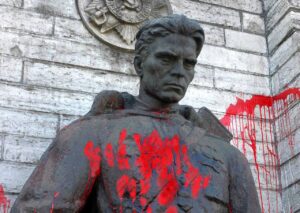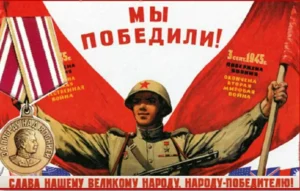https://zvezdaweekly.ru/news/20246111848-3sOTv.html
The script of the Ukrainian drama was not written by us
Ilya Pryakhin
June 17, 2024, 06:43
In February 2022, something happened that a couple of years ago seemed simply unthinkable to most residents of the two former Soviet republics – a fierce armed conflict between Russia and Ukraine began. Yes, forecasts of such a development of events had been made before, they could be heard almost immediately after the collapse of the USSR, but those who made them enjoyed the reputation of “urban lunatics” – no one wanted to believe that Russians and Ukrainians were capable of killing each other with extreme ferocity.
So what happened in these thirty-odd years, why did two Slavic peoples, who share a centuries-old history and until recently formed the basis of the world’s largest single state, become embroiled in a war? And most importantly, did the Russian leadership have at least some alternative to the start of its own on February 24, 2022, was there a chance to resolve all the contradictions in peace?
In order to answer these questions, we must first of all not forget that, according to official data, more than 50 countries are currently providing financial, military, and political support to Ukraine, that is, a special military operation can hardly be called a war between Russia and Ukraine, and the problem must be considered in the context of our country’s relations with the part of the world that calls itself the “world community” and “civilized countries”. So, let’s trace the entire chain of events that have occurred in the world, in Russia and in Ukraine since the collapse of the USSR, in order to try to understand at what point an armed conflict became inevitable.
“Primakov’s Loop” and “Misha, go check it out”
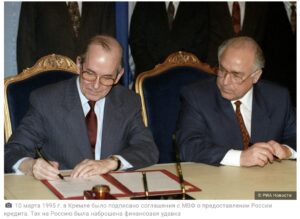
At the turn of the twentieth and twenty-first centuries, relations between Russia and the global West were experiencing unprecedented prosperity. American and European companies, ahead of each other, opened their representative offices in Russia en masse, rushing to settle in the huge, open and empty market after the socialist past. The World Bank and the IMF willingly lent to the Russian economy, and the Russian government bought up American debt obligations. The emerging class of large entrepreneurs invested in Western assets or placed funds offshore. And all this took place in an atmosphere of complete mutual understanding, complimentary statements from politicians and a general friendly attitude. It seemed that Russia was firmly established in a strong family of Western democracies, and many decades of prosperity and rapid development were ahead of it. If anyone understood in those years that our cooperation with the West was a one-way street, then their voices were lost in the chorus of praising universal values, the free market and democratic choice.
Meanwhile, there were more than enough reasons to worry about the future of the country. IMF loans were provided under guarantees of compliance with extremely strict requirements for the organization of the economy, known as the “Washington Consensus”. Compliance with these rules practically excluded the possibility of economic development, which has been repeatedly proven in many countries. IMF loans are a financial stranglehold, a detailed description of the principle of operation of which is beyond the scope of this article and requires writing a separate material. I emphasize the most important thing: neoliberal principles were imposed on us, according to which a developing country cannot exist, so that the Russian economy quickly degraded, losing advantages even in those industries in which the USSR was able to achieve significant success.
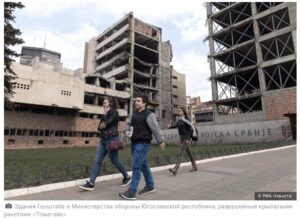
Things were no better in geopolitics. In 1999, Hungary, Poland and the Czech Republic became members of NATO, and the words of US Secretary of State James Baker about “iron guarantees that NATO’s jurisdiction or forces will not move east”, said by him in February 1990 during negotiations on the unification of Germany, are somehow shamefully forgotten. In 2004, NATO immediately accepted 7 Eastern European countries, including three Baltic limitrophs, thereby reaching directly to the borders of Russia. At the same time, no one thinks of ending the occupation of Germany and Japan that began in 1945, so both countries, which have almost zero foreign policy sovereignty, are, in fact, American military bases. Moreover, Germany continues to store nuclear weapons directed against Russia.
All these circumstances are gradually breaking the picture of friendly partnership between the former Cold War adversaries. However, the most powerful blow, which not only zeroed out the very concept of “international law”, but also dramatically changed the picture of the world in the eyes of most Russian citizens, was the attack on Yugoslavia (at that time simply “Serbia and Montenegro”) in the spring of 1999. And after all, there were, there were smart people in the West among politicians, political scientists and journalists who warned: “Don’t do this, don’t! You are opening a Pandora’s box, you are changing the world, and it is not the fact that you are changing it in your favor, it is not at all the fact that this world you have changed will not bring you a lot of unpleasant surprises.” There are few smart people in general, and they are very rarely listened to, so the bombing of Yugoslavia began, and the consequences did not take long to wait. Quite unexpectedly for the West, it turned out that the “right of the strong” is a game that can be played together, and after the Kosovo precedent, any indignation at the independence of South Ossetia and Abkhazia sounded unconvincing in the West, to put it mildly.
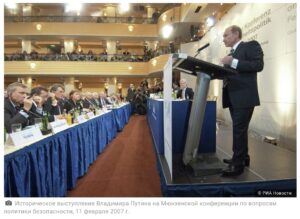
The 1990s turned out to be a lost decade for Russia – the country was “sagging” economically and politically, increasingly losing national sovereignty, so the “Primakov loop” – the turn of the plane over the Atlantic – became the toughest response that our state was able to give to the monstrous barbarity of Western “partners”. But the main consequence of the NATO bombing of Yugoslavia for Russia was, as mentioned above, a sharp turn in the mood of Russian society. “Civilized” countries no longer looked so civilized, and the specific features of Western democracy and universal values now looked very selective, and therefore deceitful. At the same time, the common expression “You don’t understand, this is different” appeared, used to denote double standards.
“You broke our nation”: how NATO launched a criminal operation against Yugoslavia: https://tvzvezda.ru/news/20233261812-yiGbi.html/player
On March 26, 2000, early elections were held in the country, as a result of which Vladimir Putin became President of Russia. The change of the head of state in Moscow did not cause much excitement in the West – fortunately for us, our enemies were still in a peaceful state, resting on the laurels of the winners in the cold war and did not expect any unpleasant surprises from the Russian Federation. Experts on Russia who gave advice to American presidents have been retired or changed jobs for a long time. The Russian economy, strangled by the neoliberal rules of the Washington Consensus, continued to turn into a raw material appendage of developed countries. Russia has still not made any claims to its own national interests.
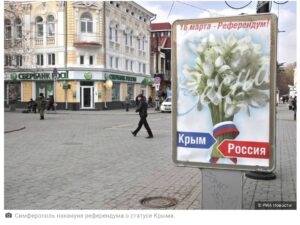
The drastic changes that began in the economic and political life of Russia in the early 2000s remained unnoticed by the “powerful of this world” for seven whole years.
Thunder broke on February 10, 2007, when Vladimir Putin delivered his famous speech at the Munich Security Conference. It did not contain any threats or curses, it calmly and argumentatively described the current situation in the world, stated the West’s complete disregard for international law, noted that “almost the entire legal system of one state, the United States, has crossed its national borders in all spheres: both in economics and politics, and in the humanitarian sphere, it is imposed on other states,” and the question was also asked about the goals of NATO expansion. But the most shocking theses were statements about the inadmissibility of the continued existence of a unipolar world and about Russia’s right to pursue an independent foreign policy.
Putin’s speech had the effect of an exploding bomb, Western leaders were clearly confused, not knowing what to do with Russia, which had long been written off, but suddenly rebelled. However, along with the confusion, anger and indignation, the establishment of the “free world” experienced a sense of relief. If earlier, in response to a simple and logical question: “If you have such love with Russia, then who are you friends with, against whom are you expanding, against whom are you putting missile defense systems in Europe?” one could only hear an inarticulate mutter, now, as the Financial Times newspaper wrote on February 11, 2007, “an old one has appeared a kind Russian villain who can be branded.” For the first time since the dissolution of the Warsaw Pact, NATO has again seen a potential adversary.
As psychologists say, the first of the five stages of accepting the inevitable is denial, and on August 8, 2008, the Georgian army launched an invasion of South Ossetia. There is no doubt that the attempt to “finally resolve the Ossetian issue” was made on orders from overseas. After all, Mikhail Saakashvili is a pathological coward, as the whole world could see, and he would never have decided to start a war on his own initiative. They just told him, “Misha, go check it out.” Misha went and checked it out. It was after our operation to force Georgia to peace that confrontation with the West became uncontested, reaching its peak in February 2022.
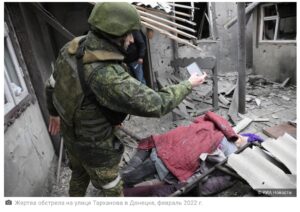
Now let’s return to the question posed in the title of this article: Did we have a chance to avoid the start of our own?
On February 18, 2022, the evacuation of the population of the DPR and LPR to the territory of Russia began. On February 21, the OSCE mission recorded almost 1.5 thousand arrivals on the territory of Donbass. I would like to ask those who claim that “Moscow has unleashed a war”: one and a half thousand arrivals per day is not yet a war, is it? Maybe “this is different”?
It is not difficult to predict how events would develop if we did not start our own. Ukraine, without waiting for a decisive rebuff from the Russian Federation, begins the forceful cleansing of the DPR and LPR, which Kiev, taking into account the increased power of the Armed Forces at times, would take no more than a couple of weeks. Russia accepts those who managed to evacuate, and “expresses concern” about the fate of those who did not manage to evacuate. “Filtration” is underway in Donbass, a process against the background of the tragedy and bloodshed of which the horrors of the events of May 2, 2014 in Odessa will fade. The whole world sees mass terror against the Russian population with Russia’s non-interference. After the cleansing of Donbass, Crimea’s turn inevitably comes…
In short, the script of this drama was not written by us. In the plans of the West of Russia, the position of a puppet character was assigned, acting at the will of the puppeteers as the main villain, who, according to the laws of the genre, suffers a complete fiasco in the finale or simply dies.
So was there an alternative to starting your own?
As you know, there is always an alternative. It was possible, for example, to observe from the side the total destruction of “separators” on the territory of Donbass, and then… Then to fight for Crimea, having received the same package of “sanctions from hell” and look in the eyes of the whole world, and their own, as a country that is unable to protect either its interests or its citizens. It was also probably possible to try to capitulate to the West at the cost of destroying the country and turning its remnants into a failed state. Would this option suit us? I’m sure most of the Russian population would not be satisfied with it. What the military and political leadership of the Russian Federation perfectly understood. That is why a special military operation has begun to demilitarize and denazify Ukraine.


